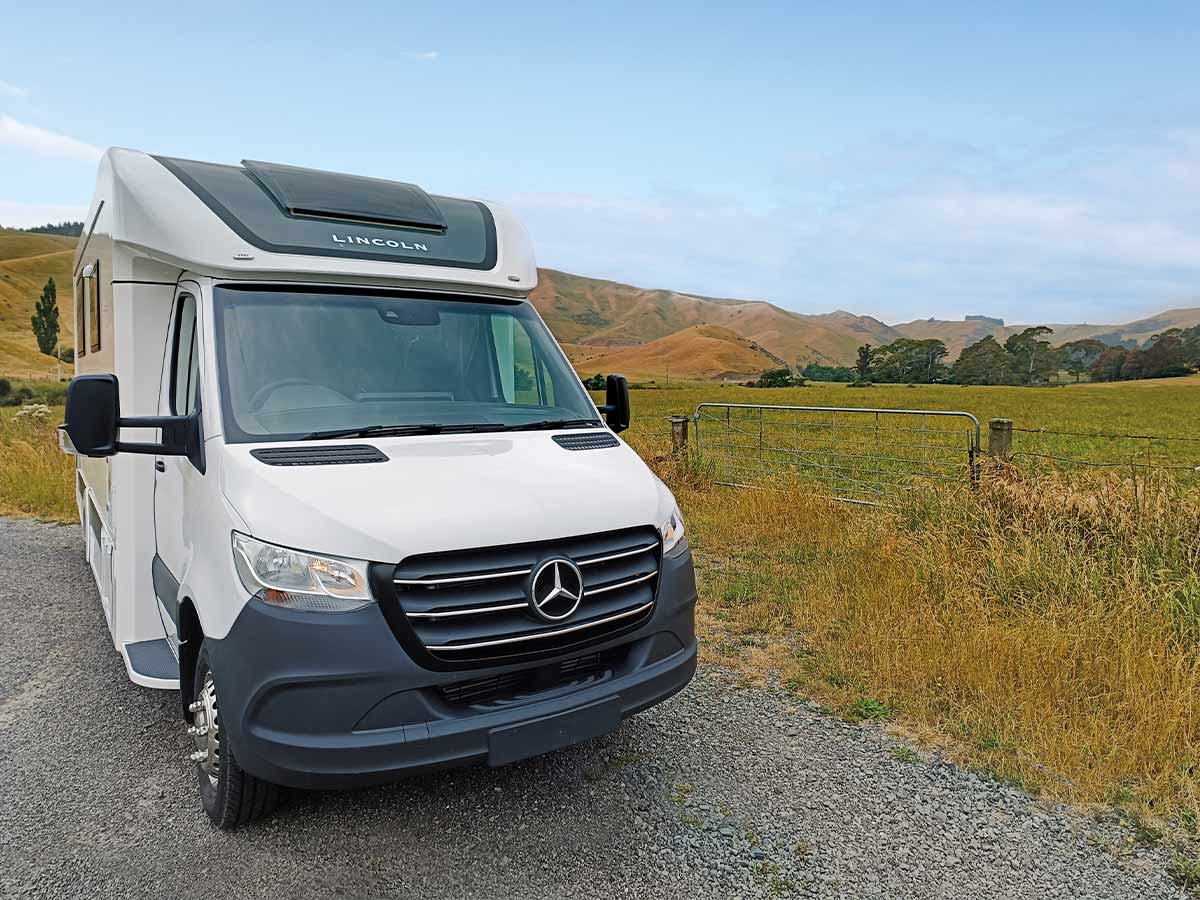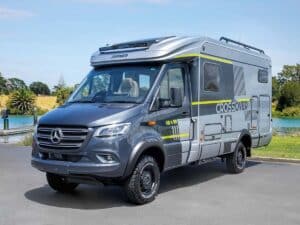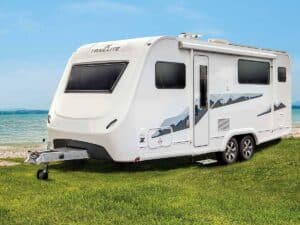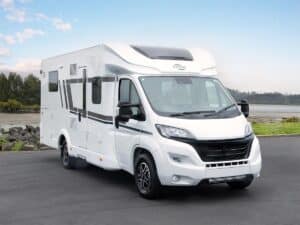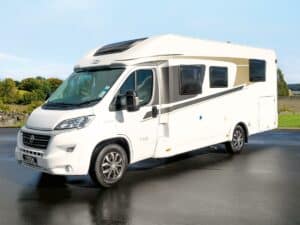Two iconic New Zealand businesses have joined forces to showcase the DCB Lincoln. The no-expense-spared luxury motorhome has been developed and built by well-regarded Christchurch special vehicle builder, Design Coach and Body, and is available from DeLuxe RV Group. Paul Owen spends some time with the recently released New Zealand build and finds it represents a refreshing alternative to mass-produced motorhomes.
Steve Ward and his highly qualified team of 28 auto electricians, engineers, panel-beaters, cabinetmakers, painters, and other tradespeople at Design Coach and Body are well-known for the high standards of their motorhome repairs and redesigns, as well as for the special vehicles they build for equestrians and adventurers.
If anyone needs a build that’s truly bespoke and one-off, DCB is possibly the best place in New Zealand to come to.
With a vast amount of expertise in the RV market, DCB also batch-build the motorhomes and campervans required for the rental fleet of Pacific Horizon. So, you’d expect the brand’s own first spec-built motorhome to be something special – and it is.
The $320,000 Lincoln adds a highly luxurious, robustly-built, Kiwi-made eight-metre-long motorhome to the market, which is strongly represented with RVs from around the globe – and by reckoning the DCB Lincoln is as good as anything made anywhere else.
The Lincoln is unapologetically a two-berth despite its length, with all the space inside reserved for the comfort of two people who will share the large longitudinal island bed at the rear of the cabin.
This confident design allows everything to be tailored to two, and the result is an interior that feels open-plan and modern, giving the opportunity to admire the quality of the cabinetry and materials without being distracted by clutter. The visual cleanliness of the Lincoln’s cabin is calming and soothing.
“It’s all about the space and the volume (inside the cabin of the Lincoln),” says Steve. “As soon as you need to add travel seats and extra seat belts, it destroys the flow inside the motorhome.”
Domestic inspiration
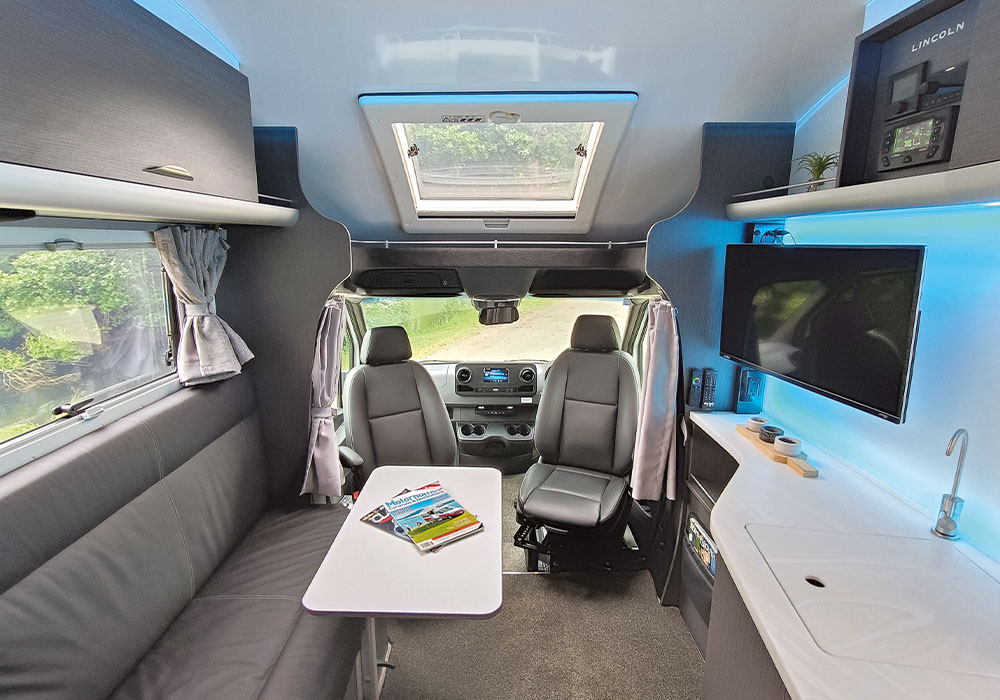
It was finishing a batch of four-berth motorhomes for Pacific Horizon that inspired Steve to build the Lincoln. The moulds for the fibreglass/foam body components had been built for the Pacific Horizon rentals but were now free to be used for something a bit more special than a fleet of relatively basic motorhomes built to meet the demands of RV-based tourism.
“After we were approached to do the four-berth for Pacific Horizon, it led to us having our own moulds. We’re a creative team and we do a lot of one-offs, so I looked at the moulds and thought what would I like?
“The answer was something that my wife and I would be happy to go away in.”
For the Wards, that dream motorhome had to be a two-berth. They had no desire to travel with others, so all the space inside the Lincoln could be optimised to their requirements. However, it’s not locked in stone that the Lincoln has to be a motorhome for couples only, as the interior can be easily revised to meet the wishes of the prospective buyer.
“There are plenty of options for those who want a four-berth.”
Fully equipped
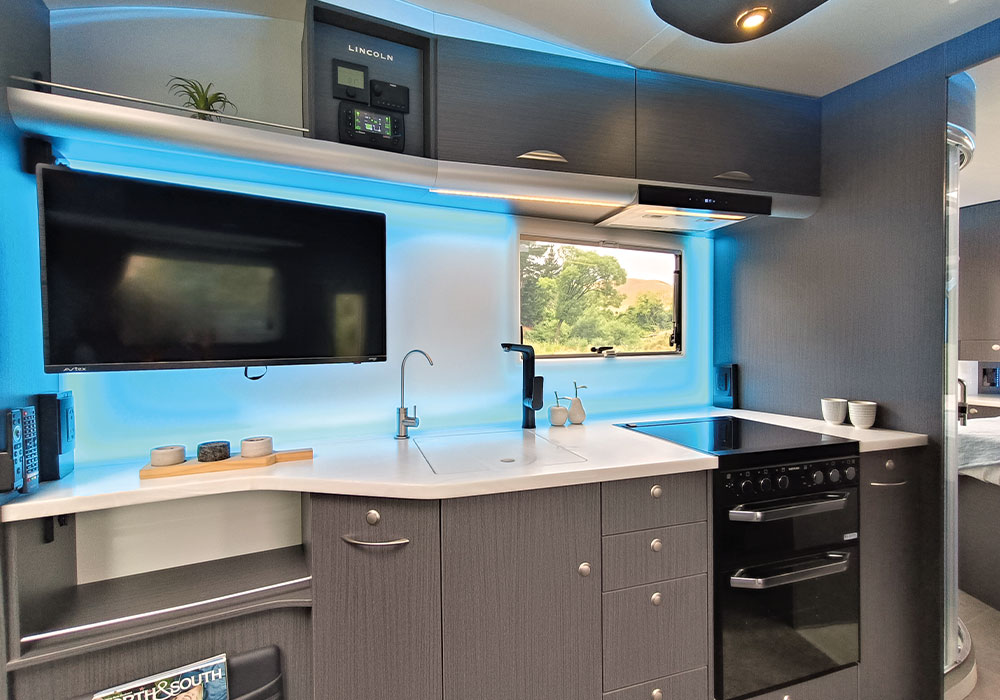
This Lincoln has been designed to include everything Steve and his wife would order themselves in their own motorhome. Given their knowledge of this market, it’s kitted out to a top-level calibre, represented in the relatively high price that reflects the many inclusions that come as standard.
“It’s got everything that we think works for relaxed and comfortable travel and accommodation,” says Steve.
“Other eight-metre motorhomes similar may start at $300,000 but then you have to add all of the extra features or elements you want on top of that.
“The Lincoln is set up and ready to go at the turn of a key and you never have to plug it in (to mains power).”
That’s because there’s an extensive solar power system, which consists of a 720w solar panel array on the roof and a complete Redarc battery management system including a 3000w 12v inverter and two 200Ah lithium batteries, taking total power storage to 400Ah. Steve says there’s $20,000 worth of components in the solar system of the Lincoln alone, resulting in the ability to recharge e-bikes and stay anywhere for long periods independently. That’s quite the bonus.
Water and gas storage match that same aim. There’s 160 litres of freshwater capacity backed up by 160 litres of greywater catchment. The LPG supply is from two 4kg bottles.
If the LPG supply looks a little light, it’s intentional. One of the big usual tasks for the gas of heating the water and cabin is handled by diesel unit instead.
“We wanted to move the Lincoln as far away from LPG as possible but couldn’t find a decent motorhome-compatible electric stove for it.”
The Thetford four-burner gas hob with an oven and grille is therefore the only appliance that uses LPG inside the Lincoln. There’s also a microwave that runs on inverter power, and the Thetford 152-litre compressor fridge and 18-litre freezer can switch between 12v and 240v.
While focused on the kitchen, other highlights include a large Corian stone benchtop, deep sink (with cover to increase preparation space) and pull-out cellarette that dispenses beverages and glasses.
There’s also a 32-inch Avex smart TV to the left of the kitchen, facing a smartly upholstered couch seat (with an adjustable table). The Mercedes cab seats swivel around and are clad in the same high-quality leather.
The colours of the ambient LED lighting strips that illuminate the living area of the Lincoln can be changed to suit the mood, but it’s the quality of the upholstery that’s the biggest highlight. You can see and feel why the leather seat coverings alone cost $9000 to get installed.
“We could have done it ourselves but farmed out the job to Patrick Auto Trimmers here in Christchurch. They’re well known for the upholstery they do on high-end hotrods.”
Last of the Mercedes V6 diesels
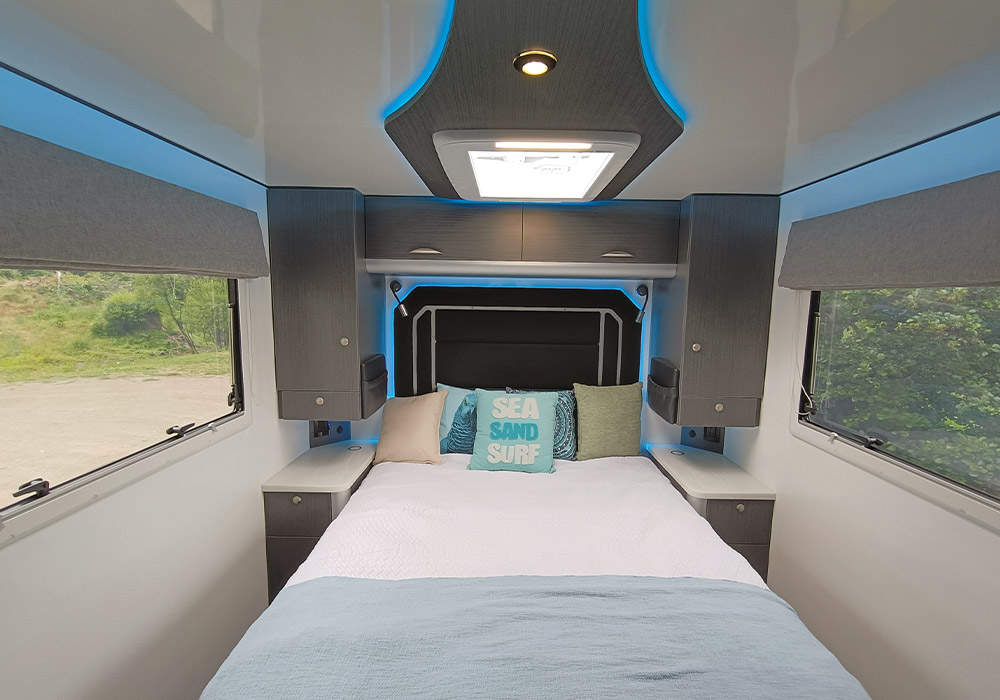
The Lincoln is based on the outgoing V6-powered version of the Mercedes Sprinter, the engine driving a rear beam axle equipped with dual wheels on either side. These six-cylinder rear-drive Sprinters have long been the mainstay of New Zealand’s motorhome industry, especially the six-berth models made for Kea by Action Manufacturing in Hamilton and the six-berth units that DCB make for Pacific Horizon in Christchurch.
Steve is sorry to see Mercedes phase them out in favour of lighter, more fuel-efficient four-cylinder rear-drive diesels that produce similar levels of power and driving force.
“There’s something about the V6 – it sounds like a proper truck engine at idle.”
Although the incoming four-cylinder Sprinters don’t have the same emotional appeal as the V6 versions, they will allow DCB to build 4WD versions of the Lincoln in the near future. The automatic gearboxes will have two added forward ratios, taking the number of speeds to nine, and will drive the rear wheels only in 2WD models, while 4WD models will feature the 4matic all-wheel-drive system that Mercedes developed for its SUV range.
The 4matic drivelines send force to the rear wheels until the wheelspin is detected and drive to the front axles is instantly engaged. As soon as rear wheel traction is restored, that drive to the front tyres quickly ceases but can re-engage within milliseconds if any further rear wheel tyre slippage is detected.
The constant reallocation of torque distribution according to the traction available at individual tyres is highly effective at keeping 4matic-equipped Sprinters trucking over slippery surfaces.
It also helps conserve tyre wear and fuel use when compared with more conventional 4WD drivelines. This urbane all-wheel-drive system will fit well with the design of the new 4WD Lincoln.
“It won’t look too off-road-y,” promises Steve.
Blenheim sales outlet
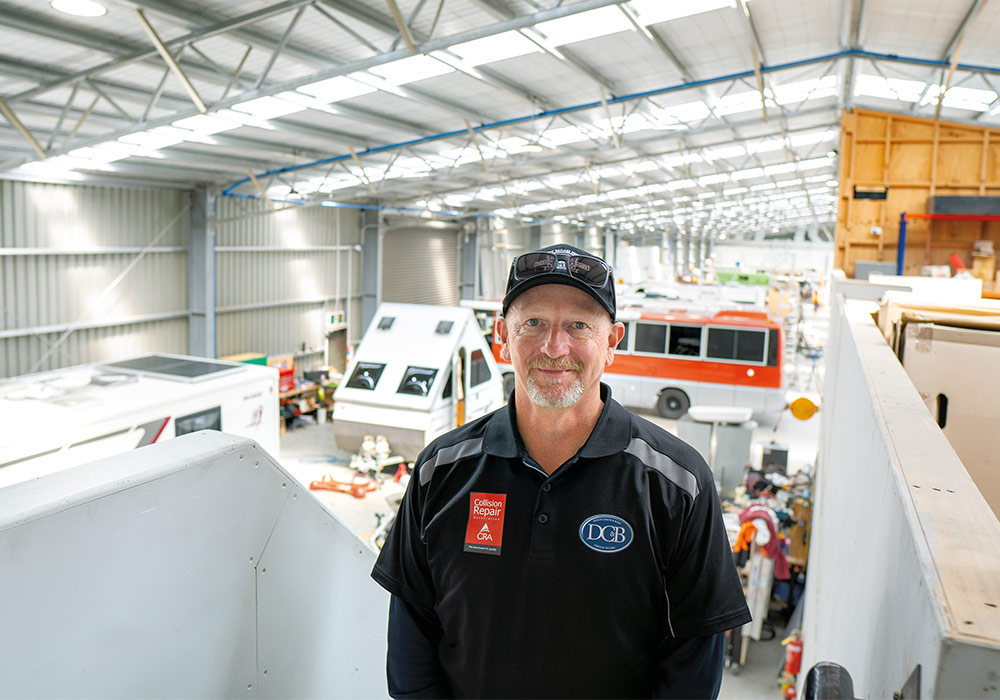
Steve has appointed the long-established Blenheim-based dealership, Deluxe RV Group, to be the sole sales outlet for Lincoln motorhomes. Run by the Smith family, Deluxe RV has been 65 years in business and added the DCB franchise to their highly respected line-up of Pilote and Le Voyageur brands.
“We’re good at making motorhomes,” says Steve, “and they’re better at selling them.”
For Deluxe RV Group general manager, Daryl Smith, having DCB represented on the sales lot is a big drawcard.
“We recently took the Lincoln to the Nelson show, where it attracted a lot of interest. People loved the spaciousness of the cabin and the overall quality of the build.
“As a Pilote owner, I was surprised by how quiet it was to drive – my motorhome is pretty quiet as they go – but there were absolutely no squeaks and rattles in the Lincoln.”
Daryl expects to sell a handful of Lincoln’s each year. These bespoke and exquisitely crafted motorhomes will come with full certification for gas, electrical, and self-containment fitness. The fitted equipment includes a bike rack capable of carrying two e-bikes with a remote-control power bike lift, an external gas feed for the BBQ, an electric step, reversing and driving camera, door-mounted rubbish bin, quality carpets throughout, water filter, central locking including the house door, a standalone shower with light and extractor unit, a second 21-inch Avex TV in the bedroom, fire and CO/LPG gas detectors, an Avtex WiFi router that connects both TVs, and chrome hub caps.
It all adds up to a turnkey luxurious Kiwi-made motorhome that matches European imports of similar status on price, then beats them for fitted equipment and fine detailing.
For those who desire exclusivity, the low volume of production means that your Lincoln is likely to be the only one in the campground when you pull in to settle down for a night or five.
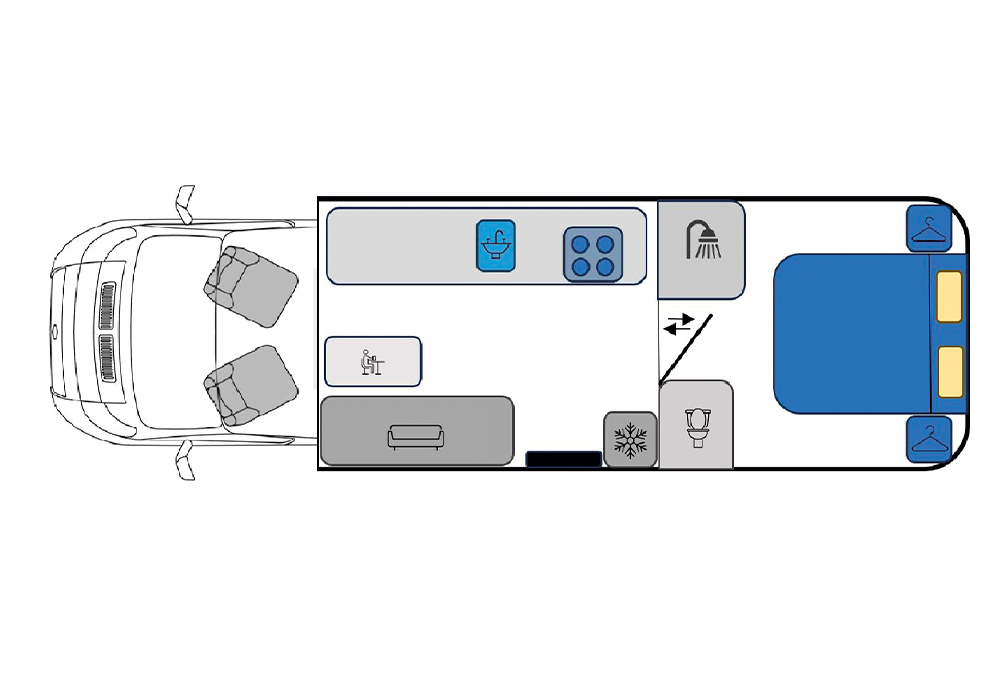
| Make and model | DCB Lincoln |
|---|---|
| Chassis | Mercedes Sprinter cab/chassis, rear-wheel drive |
| Engine | 3L V6 turbodiesel, 190bhp |
| Gearbox | 7-speed automatic |
| Berths | 2–4 |
| Length/width/height | 8300mm/2450mm/3000mm |
| Fresh/grey water | 160L |
| GVM/Payload | GVM 5000kg, Tare 4300kg, Payload 700kg |
| Price | $320,000 |

